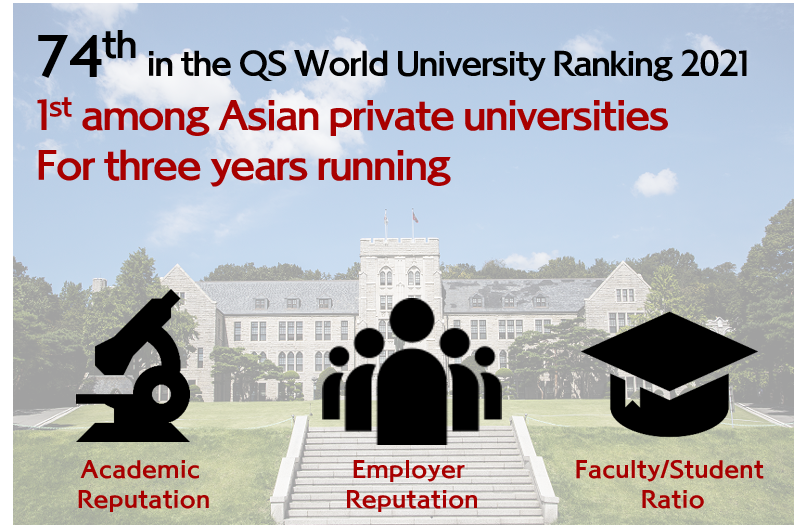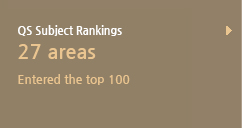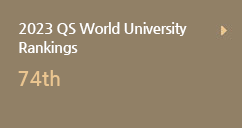Ranked first among Asian private universities for three years running
Ranked first among Korean private universities for seven consecutive years, and ranked 74th in the world
Highly rated in terms of Academic Reputation, Employer Reputation, and Faculty/Student Ratio

Korea University has been ranked first among Asian private universities for three years running.
Korea University is ranked 74th in the 2021 QS World University Rankings, which are published annually by Quacquarelli Symonds (QS).
Korea University has been ranked first among Korean private universities for the seventh consecutive year, and also first among Asian private universities for three years running. It has been positively assessed since joining the world’s top 100 in 2016.
QS listed the top 1,300 universities among 6,415 participating institutions in this year’s QS World University Rankings. The universities were assessed based on six key ranking indicators: ▲ Academic Reputation (40%) ▲ Citation per faculty (20%) ▲ Faculty/Student Ratio (20%) ▲ Employer Reputation (10%) ▲ International Faculty Ratio (5%), and ▲ International Student Ratio (5%).
Korea University is highly ranked in terms of Academic Reputation, Employer Reputation, and Faculty/Student Ratio.
◎ Outstanding indicator: Academic Reputation
In terms of academic reputation, Korea University rose five spots to 70th place, continuing its upward climb since being ranked 91st in 2018.
The university’s consistently outstanding performance in terms of academic reputation can be traced to its research-oriented programs, which create a productive ecosystem for researchers to not only generate knowledge but also to contribute to society.
The university aids researchers to publish in international journals by offering manuscript proofreading, and promotes collaborative research through interdisciplinary research support grants. The qualitative aspects of research are emphasized, and incentives are provided to pursue research excellence. In addition, the Future Research Grant (KU-FRG) allows researchers to pursue creative and challenging research, large-scale research projects, multidisciplinary research in both fundamental and niche disciplines, as well as international research.
Outstanding new faculty and world-class researchers have funding opportunities through the Inseong Research Promotion Fund, and the Research Coordinator (RC) policy offers strategic, organizational coordination for faculty research.
Thanks to the aforementioned initiatives, seven KU researchers were listed in the Highly Cited Researchers (world’s top 1%) category in 2019, which is the best record among Korean private universities. In 2020, five KU researchers made it onto the HCR list. Far from being satisfied with its current achievements, Korea University is determined to strengthen its research-oriented focus. It will establish a world-class research management system by concentrating its resources on the development of novel technology that will be essential in the long term, and create an open collaborative ecosystem (Open innovation) to address the real-world needs of companies.
In tandem with research investments, the university has established a graduate school specializing in AI research based on its strong ties with overseas universities and research institutes, and has shown continued interest in creating new markets to achieve mutual growth with commercial enterprises. It is strengthening its research capacity with a focus on fulfilling the United Nations Sustainable Development Goals (UN-SDGs) and on addressing the issues faced by the international community.
Every year, Clarivate Analytics compiles a list of the world’s top 1% most Highly Cited Papers (HCP) across 22 research fields. The number of Korea University’s research publications which have gained HCP status has increased since 2016, and in particular, it surged from 54 papers in 2018 to 75 in 2019.
In 2020, the university produced 15 and 12 HCPs in the fields of engineering and materials sciences, respectively, demonstrating its competitive edge over other Korean universities in these fields. Other research fields in which significant results were attained by KU include chemistry, clinical medicine, and ecology/environment.
The increase in KU HCPs is also reflected in the university’s growing research influence and number of citations. According to an analysis of the Scopus database, the university has shown continuous improvement in its output in terms of its presence in the top citation percentiles since 2011.

◎ Outstanding indicator: Employer Reputation
In the latest QS rankings, Korea University which is widely known to produce talent capable of meeting the demands of a changing society, ranked 50th in terms of employer reputation. Under this metric, it matched the standards of other world-class universities.
In addition to curricular programs, the university offers a wide range of non-curricular programs which enable students to broaden their horizons and even to experience the failure that is necessary to grow. In this process, students learn how to plan and execute projects, communicate with others, and work as a team. That is, they organically gain the necessary knowledge and skills expected of them by employers, and this strong foundation leads to the high level of professionalism and productivity that is sought after in the real world.
Korea University provides career development services which enable students to maximize the value of their experiences and competencies, allowing them to successfully work in their chosen fields. The Job Academy, which enhances their understanding of professional responsibilities and real-world tasks, has been especially popular, and one-to-one counseling is also available to those seeking personalized advice in their areas of specialization. The vast range of over 30 programs offered by the Academy includes the Interview Clinic, which simulates job interviews with employers, the SOP Proofreading Clinic, the Meeting with Alumni program which enables students to network with graduates who are active in all spheres of society, and practical career study groups led by successful graduates.
In June 2020, the university launched KUchive, an integrated management system for curricular and non-curricular programs as part of its immersive smart campus project. The system helps students to manage their activities at all stages from admission to graduation, allowing them to track their curricular and non-curricular activities and to assess their own competencies. Students are offered self-development guidelines based on their self-identified weaknesses so that they can independently optimize their performance. Other KUchive features include integrated counseling, career information, and certificate issuance.
With the establishment of KUchive, the university has become more effective in analyzing and managing the development of students’ key competencies based on accumulated data.
The university’s encouraging academic atmosphere, high quality curricular and non-curricular offerings, and vast career development resources are factors that contribute to its positive evaluation in terms of employer reputation.
◎ Outstanding indicator: Faculty/Student Ratio
In terms of faculty/student ratio, Korea University climbed 25 spots to 89th place from 126th in 2019 in the QS rankings, continuing its upward trajectory.
The university has attracted outstanding faculty under its special faculty invitation program. By bringing in faculty who specialize in the social sciences, natural sciences, engineering, and basic medicine, it is improving its education and research capacity in diverse subject areas. KU compares and analyzes the number of citations, the field weighted citation impacts (FWCI), and the field weighted impact factors (IF) of current faculty, non-KU researchers who are active in similar fields, and potential new faculty.
Since last year’s QS World University Rankings, the university has improved its educational offering by recruiting over 100 new faculty as of the second semester of 2020. Its extensive preparations for the fourth phase of BK21 have also contributed to the creation of a more conducive environment for teaching and learning.
The university has expended significant efforts in attracting international faculty, so as to strengthen its capacity for international research cooperation and its global research competencies.

MIT took the top spot in the World University Rankings, followed by the University of Oxford in second place, and Stanford University and Cambridge University in joint third. Among Korean private universities, Yonsei University in 79th place, POSTECH in 81st, and Sungkyunkwan University in 97th all came in behind Korea University.
In the QS Asia University Rankings 2020 released last November, Korea University was in 11th place in Asia and in 1st place in Korea. It has topped the list of Korean universities since the introduction to the rankings of international research cooperation as an indicator in 2018, and has fared well in both the employer reputation and researcher reputation categories. In the QS World University Rankings by Subject 2021 released last March, the university was named among the top 100 in 27 subjects, again posting the best performance in this respect among Korean private universities. Unlike other universities, it displayed a balanced performance across the humanities and natural sciences, being featured in the list for 14 subjects in the former and for 13 in the latter.
Jang Gil-soo, the Vice President for Planning and Budget, said, “Korea University is consistently evolving into a research-oriented university, and provides competitive programs to foster creative talent capable of making a real social contribution. We will continue to strive for the sustainable development of humanity in the fields of education and research.”



